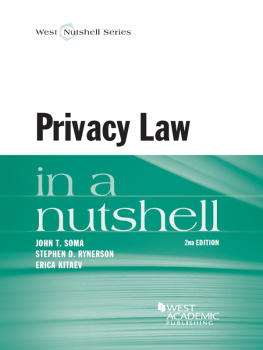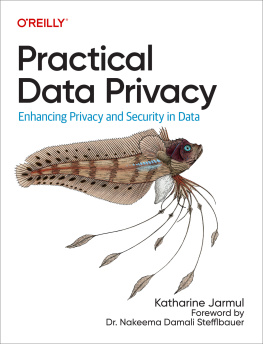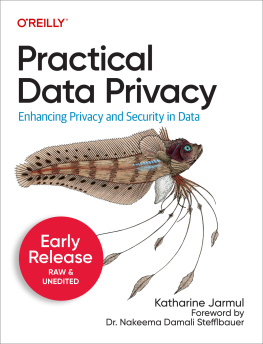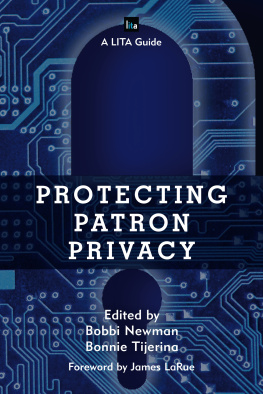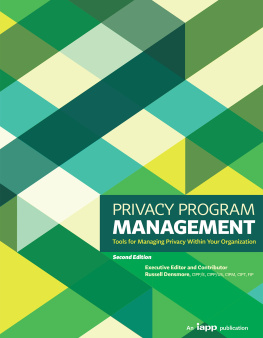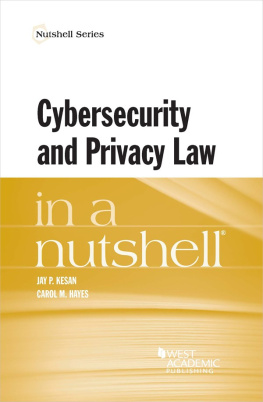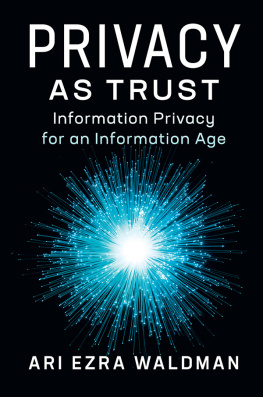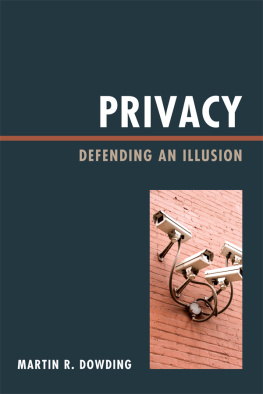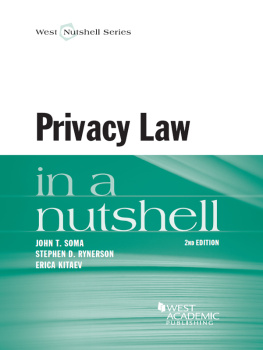Landmarks
Page list

WEST ACADEMIC PUBLISHINGS
LAW SCHOOL ADVISORY BOARD
___________
JESSE H. CHOPER
Professor of Law and Dean Emeritus,
University of California, Berkeley
JOSHUA DRESSLER
Professor of Law, Michael E. Moritz College of Law,
The Ohio State University
YALE KAMISAR
Professor of Law Emeritus, University of San Diego
Professor of Law Emeritus, University of Michigan
MARY KAY KANE
Professor of Law, Chancellor and Dean Emeritus,
University of California,
Hastings College of the Law
LARRY D. KRAMER
President, William and Flora Hewlett Foundation
JONATHAN R. MACEY
Professor of Law, Yale Law School
ARTHUR R. MILLER
University Professor, New York University
Formerly Bruce Bromley Professor of Law, Harvard University
GRANT S. NELSON
Professor of Law, Pepperdine University
Professor of Law Emeritus, University of California, Los Angeles
A. BENJAMIN SPENCER
Professor of Law,
Washington & Lee University School of Law
JAMES J. WHITE
Professor of Law, University of Michigan
I
PRIVACY LAW
IN A NUTSHELL
SECOND EDITION
by
JOHN T. SOMA
Professor of Law
University of Denver Sturm College of Law
Executive DirectorPrivacy Foundation
STEPHEN D. RYNERSON
Bryan Cave LLP
Denver, Colorado
ERICA KITAEV
Baker Hostetler LLP
Denver, Colorado

Mat #41498848
II
The publisher is not engaged in rendering legal or other professional advice, and this publication is not a substitute for the advice of an attorney. If you require legal or other expert advice, you should seek the services of a competent attorney or other professional.
Nutshell Series, In a Nutshell and the Nutshell Logo are trademarks registered in the U.S. Patent and Trademark Office.
2008 Thomson/West
2014 LEG, Inc. d/b/a West Academic
444 Cedar Street, Suite 700
St. Paul, MN 55101
1-877-888-1330
West, West Academic Publishing, and West Academic are trademarks of West Publishing Corporation, used under license.
Printed in the United States of America
ISBN: 978-0-314-28942-1
III
ACKNOWLEDGMENTS
___________
We owe our thanks to those who have helped us on this Nutshell. University of Denver, Sturm College of Law, research associate Jonathan Gray, assisted us in numerous drafts, as well as the final draft, by suggesting many revisions, as well as organizing and tracking the normal plethora of last minute changes. Law students Alexandra Molina and Morgan Batcheler greatly assisted with early drafts. Thanks go to Associates Tina Amin and Aaron Thompson, with Baker Hostetler LLP, Denver, for their extensive research and editing. Our thanks also go to Cindy Goldberg, Administrative Assistant to the Privacy Foundation for her ever-present support and helpful comments.
JTS
SDR
EGK
V
OUTLINE
___________
VI
VII
VIII
IX
X
XI
XII
XVII
PRIVACY LAW
SECOND EDITION
CHAPTER ONE
INTRODUCTION
We live in a world where information is the foundation of modern society. Federal, state, and local governments, as well as intergovernmental organizations, assemble near-limitless amounts of personal information concerning individuals birth, marriage, divorce, property, court proceedings, driving records, political activities and affiliations, criminal transgressions, professional licensing, travel, and countless other activities. Private businesses also gather personal information for marketing purposes, to prepare credit histories, or to sell to various other entities, both private and public. This collection of personal information by its very nature implicates the concept of privacya concept of central importance in todays technological world.
Before venturing into the complex and difficult task of defining privacy one must understand why the topic is important and why privacy law is one of the most exciting developing fields of legal study. Professor Roger Clarke, a pioneer in the field of privacy and information technology, describes individual privacy as consisting of four dimensions: the psychological, the sociological, the economic, and the political. Psychologically, people need private space to preserve a sense of individual identity. Sociologically, people require the opportunity to connect and interact with others, but without the continual threat of being observed. These dimensions of privacy have long been recognized. Indeed, as the Eighteenth Century British philosopher Jeremy Bentham wrote in describing his vision of the ultimate prison (the Panopticon), the most important point [is] that the persons to be inspected should always feel themselves as if under inspection . More recently, the economic and political dimensions have come to be recognized as critically important as well. Economically, people must be able to plan and innovate without their efforts being subject to continual scrutiny by others who might seek to appropriate their ideas. Politically, if representative governments are to be functional, people need to be able to think, argue, and act without fear of their identities being exposed. For a free political system to function successfully, people must be able to vote without the fear of retribution from others who hold a different viewpoint. Individuals must have privacy in their choice to engage in the political process, as well as in their decision of what causes to support. All four of these dimensions inform the study of the law of privacy.
It is vital that both lawyers and the public in general become familiar with the study of privacy law. First, with the increasing rapidity of technological advancement and ever-greater exchanges of information, notions of privacy are being challenged as never before. Through the collection, manipulation, and dissemination of personal information, commercial and government entities are gaining more influence over individual autonomy and decision making. As members of a democratic society we have the choice, through studying and understanding privacy laws, to shape the kind of society we desire as we move ever deeper into the Information Age. Second, and flowing in large part from the first trend, public concern over invasions of privacy has grown tremendously in the last few decades. Privacy concerns appear with increasing frequency on the legislative agendas of Congress and state legislatures, and garner increased media attention with each subsequent revelation about theft or misuse of personal information. Third, at the nexus of the first two trends, we find an increasing amount of litigation which implicates privacy law, either directly or indirectly. Lawyers are faced with drafting privacy policies for businesses, litigating privacy issues, and helping a variety of industries and government agencies conform to ever more complex and pervasive privacy regulations.
Most law students will receive only tangential schooling on the subject of privacy law. Criminal procedure discusses the constitutional limits on where police can go and what evidence the police can collect in criminal investigations under Fourth Amendment searches and seizures; reproductive, sexual and family privacy is deemed a subset of First and Fourteenth Amendment jurisprudence; and privacy in cyberspace is often treated as a subset of intellectual property or communications law. None of these particular courses, however, are aimed at providing students with a systemic framework through which broader debates about privacy issues can be examined. As a result, privacy problems are often not well articulated and we, who are being affected by privacy intrusions, are faced with the lack of a convincing account of what is at risk when privacy is threatened and what exactly the law must do to solve these problems. Rather than using a narrow, topical framework that isolates specific sub-types of privacy protection, privacy law is best understood by first approaching it from a broad conceptual perspective before moving to an examination of particular sub-topics.

